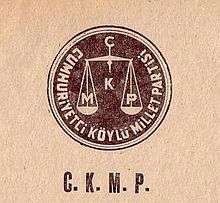Nation Party (Turkey, 1948)
The Nation Party (Turkish: Millet Partisi) was a conservative and nationalistic political party developed as a third option within the then bipartisan system in Turkey. It lasted from 1948 until 1953, when it was outlawed.
History
Formation and split
The Nation Party was founded on July 19, 1948 by former Prime Minister and Chief of Staff Fevzi Çakmak, Osman Bölükbaşı, Enis Akaygen, Yusuf Hikmet Bayur, Mustafa Kentli, Osman Nuri Köni, Kenan Öner and Sadık Aldoğan. The founders were from a conservative clique within the Democrat Party (Demokrat Parti). One of the reasons for their establishment of the party was the claim that the Democrat Party was ineffective as opposition to the Republican People's Party (CHP), the Turkish People was trapped between two political alternatives and a third alternative with a nationalistic ideology was necessary. Fevzi Çakmak was appointed as the honorary leader of the party.[1][2]
The Nation Party did not participate in the 1948 elections. Before the 1950 elections, on April 8, Fevzi Çakmak made an announcement claiming that Republican People's Party's oppression was getting fiercer. Two days later, on April 10, he died from complications following a prostatectomy.[1] At the elections on May 14, 1950, at which the Democrat Party had won 55% of the votes, it received 3.11% of the votes (250.414 votes) to win one seat, and one of the founders, Osman Bölükbaşı became an MP.
In 1954, before the elections on May 2, the Nation Party was shut down and declared outlaw on grounds of "anti-Laïcité" politics. The founders of the party, led by Osman Bölükbaşı subsequently formed the Republican Nation Party (Cumhuriyetçi Millet Partisi) and won 5 seats in the parliament. All these five MPs were from Kırşehir, the hometown of Bölükbaşı.[2] On June 24, 1957, the parliament stripped the Republican Nation Party leader Osman Bölükbaşı of his parliamentary immunity on grounds of "insulting the incorporeal personality of the parliament" and Bölükbaşı was arrested on July 2, on a court decision, which was abolished by another court order on July 23. Two days later, on July 25, Bölükbaşı was once again arrested. When he won a seat at the elections on October 27, along with three more from his party, Bölükbaşı was released on immunity.[1]

On October 17, 1958, the Peasants' Party of Turkey merged with the Republican Nation Party to form the Republican Peasants' Nation Party (Cumhuriyetçi Köylü Millet Partisi - CKMP). On June 12, 1960, following the May 27 coup d’état, the junta, dubbed the "Committee of National Unity", dissolved the parliament and on June 13, closed the district organizations of all political parties.[1]
In 1961, when the civil parliamentary system was once again in effect, on October 15, the general elections were held, at which the Republican Peasants’ Nation Party received 14% of the votes to emerge as the third party and win 54 seats in the parliament and 16 senators. However, Osman Bölükbaşı refused to take place in the coalition government.
The CKMP members of parliament along with the members from the four remaining parties and the independent members signed a declaration on October 11, 1962, stating that they are "determined and decisive to confront any transgressions of the foundation built by the national revolution of May 27." Subsequently the parliament decided a partial pardon for political prisoners. On June 15, 1962, the CKMP became part of the coalition led by İsmet İnönü. However, when the Justice Party emerged victorious at the 1963 elections, Osman Bölükbaşı, together with 28 MPs, resigned from CKMP to establish once more the Nation Party and be elected its president.[2]
CKMP after Bölükbaşı
On November 28, 1963, following the withdrawal of CKMP and New Turkey Party (YTP) from the government, the coalition broke up and Prime Minister İsmet İnönü resigned.
In 1965, a meeting took place with opposition leaders, including the president of CKMP, Ahmet Oğuz and of the revived Nation Party (see below), Osman Bölükbaşı, which caused the government to resign. The new government led by independent senator Suat Hayri Ürgüplü had four ministers from the CKMP. In spring 1965, Alparslan Türkeş, along with "the 14s" who were expelled from the Committee of National Unity, joined the CKMP. In August 1965 Türkeş became the new president, upon which the party gained a more nationalistic and Pan-Turkist ideology, and was hierarchically restructured after the old leadership was eliminated from the administration. General elections were held on October 10, 1965 at which CKMP won 11 seats at the parliament and 4 at the senate. However, the 2.2% of votes meant that it was losing ground.
On February 6–9, 1969, at the extraordinary party congress, the name of the Republican Peasants’ Nation Party was changed to Nationalist Movement Party (Milliyetçi Hareket Partisi – MHP).
The 1962 party
In 1962 the name was reused when Osman Bölükbaşı and a group of deputies and senators left the CKMP after a conflict and founded a new party. After some initial electoral success the party did not win any seats in the 1973 general elections, eventually dissolving itself in 1977.
The 1992 party
In 1992, the name was reused again when the Reformist Democracy Party (Islahatçı Demokrasi Partisi), led by Aykut Edibali, renamed itself as Millet Partisi.
References
This article incorporates material from articles from the Turkish Wikipedia.